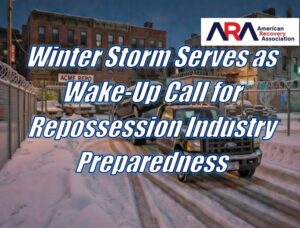EDITORIAL
The repossession agency whose agent was shot in the leg on May 23rd has released a truck cam video of the shooting for distribution and we thought this might be a good reminder to both the repossession AND Lending/Collections industries, just what it can be like working on the streets of America trying to repossess collateral.
As illustrated in the video, this did not even occur during a repossession. This was the result of simply driving a repossession agency tow truck through one of the many gang infested neighborhoods of our nation.
In the video, at about 9 seconds in, we see a white mini-van driving in front of the tow truck and suddenly pulls over to the right where a passenger jumps from the vehicle and opens fire.

In a separate video of the same event, from the trucks rear camera, the audio is clearer and the sound of gunfire is much easier to hear as the shooter maintains firing while the driver is nearly a whole block away.
 Watch the Rear Camera Video and Hear the Gunfire!
Watch the Rear Camera Video and Hear the Gunfire!
Click Here!
The career as a Repossession Agent is obviously risky. Unfortunately, it is becoming more and more difficult to find qualified agents. The reasons why are obvious. Income!
How many of you outside of the repossession industry would risk their lives driving a repo truck long days and nights with no hourly wage, no benefits and be required to function in the most dangerous neighborhoods in the nation for the hope of a contingent $75 repossession fee? Not many, if any, of anyone in the lending and collections world would.
Regardless, it is a job that Lenders need done.
It should come as no surprise to anyone in this industry that repossessions are dangerous. Every year, one or more recovery agents is killed in the line of duty and many more seriously wounded.
Unfortunately, incidents like these are far more frequent than most people in the lending, forwarding and collections industries are aware of. Not every incident makes the internet or here at CUCollector or any of the other fine sites like Repoman.com or Repo Buzz. The reason why not is simple. There is too much at risk.
Repossession agencies are all struggling to stay in business. The cost of operations and insurance have gone through the roof. Being involved in a shooting or other bodily injury situation or vehicle damage can very easily be enough to close any repossession agency. Filing a claim on the affected agencies insurance can be catastrophic to an agencies survival.
Insurance expenses alone account for the largest number of the agency closures every year. Because this mandatory, but extremely expensive coverage covers very little but has extremely high liabilities, the pool to pay for injuries and wrongful deaths requires some severe annual adjustments to even exist. Once an agency files a claim, the insurance pools loss ratios increase and when that happens, the annual premiums are raised. Often to the point of unsustainability to the agencies and the insurance pool to pay claims thins as more repossession agencies leave the business which then presses more of the risk expenses onto the remaining agents in the pool.
At some point, if the number or repossession agencies in the insurance pools reduces too much, there may be no repossession insurance or insured agencies due to the expenses.
Inflation and insurance expense are nothing new to anyone in business, but then again, I can’t think of another industry where the business incomes have been utterly decimated by contingent and flat fee structures that have been the same for almost 30 years simultaneous to the eradication of other income sources like close fees, storage, keys and delivery.
When I asked at the beginning of this editorial who would be willing to put their heads on the line for $275, I seriously hope you watch the video and consider the act that the agent who was shot, works for about $75 per repossession contingent. That is an average commission for a repossession and that commission has remained relatively unchanged just as it has for the agencies.
Because the lenders want a flat rate nationwide for easier budgeting of repossession expenses, forwarding companies have to charge the same rate for a repossession in Tulsa, Oklahoma as they would in more expensive areas to operate in like California and Chicago. At some point, no one in these high expense areas will be willing to take work from forwarders.
For the forwarders, this will be a service failure to the lenders and for the lenders, this will result in more lost and depreciating collateral that they can not recover and their loss reserves will require higher adjustments that will drive down their own profitability, and we all know they can’t simply raise rates in certain areas (red lining).
Forwarding is the primary culprit of this unsustainable business model. While the agencies incomes are flat or lower, the forwarders are charging fees between $650 to $800 per repossession, merely for being an outsource repossession division for the lenders.
While I have no real problem with the forwarding model, I do find that the fee terms being placed on the agencies has gotten out of hand to the point it threatens the sustainability of the model as well as that of the agencies themselves.
There are currently over 20 repossession forwarding companies across the United States. These forwarders manage approximately 80% of all bank repossession activity. As repossession agencies close, the forwarding industry struggles to find agencies to cover their territories and has to loosen up on some of their standards just to get cars picked up.
It is just a matter of time until we start seeing some of the smaller forwarding companies fold. Their business models are susceptible to failure if they can not provide the lenders service at a competitive price point.
Putting it in simple terms, if either the repossession agency fee income is not increased by the forwarders or the lenders aren’t willing to make adjustments to what they will pay to accommodate for inflation and territorial costs of operations, the entire business structure as we know it, will cease to exist in the future. Forwarders as well as repossession agencies will close and all of the service companies that depend on them for business will as well.
And of course, let’s not lose sight of the agents patrolling the mean streets of America and putting their lives on the line to recovery collateral for the forwarders and lenders.
In a country with a 4.9% unemployment rate and with cities raising minimum wages to $15 per hour, who wants to get shot or killed for $75?
Chicago Repo Shooting Caught on Video!
Chicago Repo Shooting Caught on Video! – Chicago Repo Shooting Caught on Video! – Chicago Repo Shooting Caught on Video!











More Stories
Westlake Clawing Back Paid Milage Fees – Agents Furious
Ode to A Repossessor – 1947
Man Gets Slap on the Wrist from Court for Endangering Repossessor
Santander Demands 20 Days Free Storage – There’s That Sucking Sound Again
2018 Annual Northeast Debt Collection Conference
Chase Pays Primeritus up to $800 on a Repo